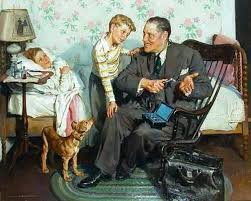
Many thousands of Americans rely on independent family physicians, and if we do not act boldly and quickly to save them, we risk eviscerating the heart and soul of healthcare in communities nationwide.
COVID-19 pushing primary care to brink of collapse
Dr. Farzad Mostashari
Last month, the newly designated CEO of the American Academy of Family Physicians issued a dire warning in a single tweet. “The front lines are crumbling,” he wrote. He was talking about the tens of thousands of small primary-care practices across the country. These small businesses, he noted, staples of their communities for decades, desperately “need money for supplies and operations” amid the COVID-19 crisis.
On March 27, President Donald Trump signed a $2 trillion-plus stimulus bill into law. The package provides $290 billion for individual and family payments, more than $25 billion to passenger airlines, $12 billion for housing assistance, but zero funding specifically dedicated to independent medical practices that are on the front lines of the battle against COVID-19, and on the verge of going out of business.
By all accounts, we are merely in the opening salvo of the COVID-19 outbreak in the U.S., and already our defenses are falling apart. Many thousands of Americans rely on independent family physicians, and if we do not act boldly and quickly to save them, we risk eviscerating the heart and soul of healthcare in communities nationwide.
Last week, I surveyed the more than 550 primary-care practices our company, Aledade, works with across 27 states. They are facing stark decisions.
One family practice in Arkansas that has been in business for half a century just laid off 12 members of its staff. Another North Carolina practice told our company that they have two weeks until they go broke. A doctor in California is in quarantine after exposure to a patient with COVID-19, and her practice is shuttered.
Why are the practices under such strain? The very steps they are taking to protect their patients, their staff and their communities could mean their financial ruin. They have been reaching out to their vulnerable and elderly patients, advising them to stay home and stay safe. They answer hundreds of questions and triage what they can over the phone, and—while they still have masks to protect themselves—provide consultations to potential COVID-19 patients in the parking lot. But health plans and Medicare reimburse them predominantly for face-to-face visits, and those visits are disappearing under COVID-19 precautions.
We have scrambled to set up one potential solution, telehealth, for most of our practices, but it provides 30% less revenue than an office visit. For the hometown independent primary-care practice in rural Kansas, that’s a drop that would turn off the lights for good.
If primary-care practices don’t get the support they need—and quickly—we will see the doors shut in small practices across the country. Ultimately, that doesn’t just mean we’ll be weaker in the fight against COVID-19. It means we will actually make it worse. It means patients who are dealing with complex, chronic diseases like diabetes or congestive heart failure will be left on their own, or forced to go to overcrowded emergency departments where they face higher risk of exposure to patients with coronavirus.
Our nation needs to act now to save primary care. We need dedicated support for front-line practices. This recent stimulus law included $100 billion for every healthcare facility, meaning that large hospitals also slammed by COVID-19 are likely to use most, if not all, of that funding, and leave little for the small, independent practices. If there is another stimulus package, providing a one-time extra payment of just $200 per Medicare beneficiary to their primary-care physicians would be a vital lifeline. Less than $10 billion would be enough to keep a crucial part of our healthcare system functioning at a crucial moment.
This support—directed immediately at the small practices that need it most—might be enough to forestall mass layoffs of healthcare workers, fortify our defenses, and even give us the tools to come out of this challenging moment stronger—and healthier—than before. Then we can engage in a serious discussion about changing how we pay for primary care in this country.
Modern Healthcare is providing some COVID-19 coverage for free as a public service and a show of gratitude for the frontline workers. Support essential journalism. Please subscribe here.
RELATED BLOG POST:

